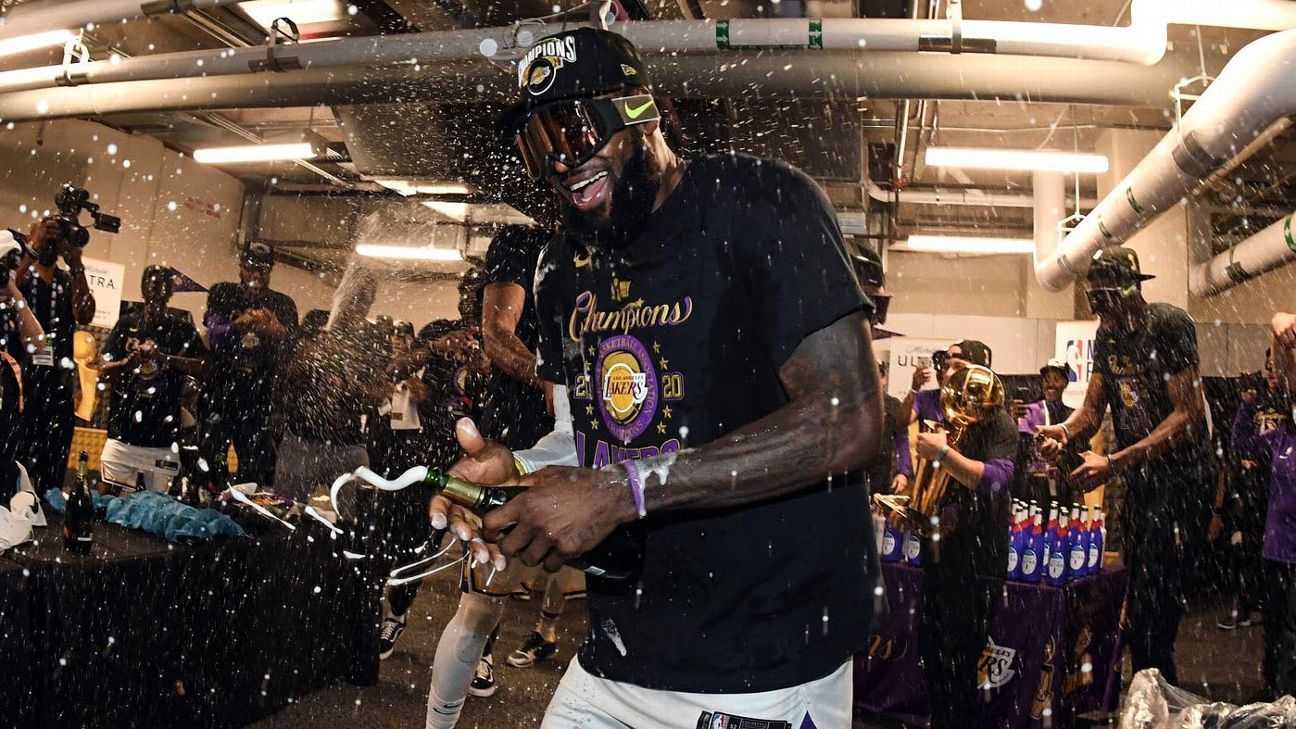LAKE BUENA VISTA, Fla. — Drake’s latest hit, “Laugh Now Cry Later,” was blaring in the Los Angeles Lakers’ makeshift locker room at AdventHealth Arena. And fresh off his fourth NBA championship, LeBron James needed a quieter place to talk.
Drenched in Champagne, goggles strapped to his face, holding a lit cigar in one hand and his phone in the other, the 35-year-old just wanted to FaceTime his mother, Gloria.
“I love you. I love you. … You are the reason why I’m able to even do this, Mom,” James told her, splayed out on a carpeted stretch of the hallway about 100 feet from the locker room entrance. “You don’t understand — 16 years old, you bring a little-ass, big-headed-ass boy into the world? C’mon. C’mon, Mom.
“Like everything that you’ve been through, everything that I’ve seen, there’s nothing that can stop me. Because this s— right here is nothing compared to the s— you had to go through.”
This was the most trying season James had experienced in his 17-year career, although not because of basketball. That fell into place almost immediately in his first season with Anthony Davis as his teammate and Frank Vogel as his coach.
It was everything that surrounded basketball, in a year of heartbreak and obstacles.
“Once I got inside here,” James said of the NBA campus, “I said, ‘OK, this is my mission. I want to win a championship. This is why I’m here.'”
MORE: How LeBron and the Lakers fought heartbreak to win the NBA Finals
THE BLOWOUT NATURE of Sunday’s Game 6 meant the Lakers could start preparing for their championship celebration early.
JR Smith, who was famously shirtless for the 2016 Cleveland Cavaliers‘ entire title parade, had already discarded his warm-up shirt before the final buzzer, even though he hadn’t played at all.
In between semi-private moments of celebration, players did live TV hits from the court, with their children in the background shooting on the baskets. Dion Waiters’ son, Dion Jr., bounded his way across the NBA Finals logo, bottle of sparkling cider in hand, and exclaimed to no one in particular: “I got to hold the trophy!” (“He’s a handful,” his dad said later with a smirk.) Other children made confetti angels out of the Larry O’Brien Trophy-shaped pieces of paper that had been shot from confetti cannons.
As that confetti engulfed the court in Orlando, Lakers guard Avery Bradley was jumping up and down celebrating the franchise’s 17th championship in his living room in Texas. His three children were in purple-and-yellow Lakers sweatsuits.
“Everyone was going crazy,” Bradley said over the phone on Sunday night. “Everyone was excited. My wife was excited.”
In late June, Bradley told the Lakers’ front office that he was opting out of the NBA restart in Orlando. His 7-year-old son, Liam, has a history of respiratory illnesses. Bradley and his wife, Ashley, worried he wouldn’t be cleared to join the family at Walt Disney World, even when the league expanded the bubble to include guests.
“I think it is something that is hard, obviously, not being there,” Bradley said. “But I think from the beginning I’ve been able to be at peace.”
Since the final buzzer of Game 6, Bradley’s phone has been ringing. Friends reached out. Family members called. Bradley sent texts to all of his teammates. He dropped a note in the team group chat — which includes DeMarcus Cousins, another player who spent most of the season with L.A. but wasn’t with the team in Orlando. He said he received FaceTime calls from point guard Quinn Cook, assistant coach Phil Handy and general manager Rob Pelinka from that noisy locker room.
“He was just letting me know I am a part of it,” Bradley said of his call with Pelinka. “It has been a long season — and an amazing one. And we’ve been through a lot. It was just an amazing win. You could see it on his face.”
While his teammates were getting back in shape through the seeding games, Bradley — who started in 44 games for Los Angeles this season — was helping to homeschool his son. But in the evenings, when games were on, he would plop down on the sofa with Ashley, his children and sometimes his mother-in-law.
“I watched every single game,” Bradley said. “I am still a Laker.”
Bradley said that before the first game of every series, he had a phone call with Pelinka. He shot off text messages of encouragement to his teammates before games and congratulated players and individual performances afterward. After Davis put up 34 points, 9 rebounds, 5 assists and 3 blocks in his NBA Finals debut, Bradley texted him that he’d never seen a game quite like that.
The Lakers sealed the No. 1 seed in the West in the first three games of the NBA restart. That was thanks to the work that the team, including Bradley, had already put in before the season was paused in March. Pelinka has already said that Bradley will be receiving a ring.
“You play your whole career working for a championship,” Bradley said, “and knowing that I was this close and a part of something, even though I wasn’t there, is still an amazing feeling.”
AS THE GAME clock ticked down, Lakers owner Jeanie Buss — who had watched through plexiglass — was led down to the court. Pat Riley, who had also been sitting in the upper tier, sent a text to Heat security informing them he was coming down. Within minutes of his team exiting the court, Riley was stationed outside Miami’s locker room — previously a no-fly zone for second-tier bubble guests.
Joey Buss joined his sister on the court to watch her accept the Larry O’Brien Trophy from commissioner Adam Silver.
In 2009, Joey Buss was a 25-year-old newlywed when his father, the late Dr. Jerry Buss, sent him to handle the trophy ceremony at the 2009 NBA Finals, also in Orlando.
“I was a little bit speechless,” said Buss, now 36.
He stood on stage in 2009 with Kobe Bryant, commissioner David Stern and ESPN reporter Stuart Scott, and spoke for 38 seconds total.
Joey Buss started with the Lakers by shadowing then-coach Phil Jackson, trying to take in as much as he could. Now he runs the Lakers’ G League franchise. One of the South Bay Lakers’ greatest success stories, Alex Caruso, started Game 6 against the Heat and registered a plus-minus of plus-20 in 33 minutes — the best mark on the team. While Jeanie accepted the trophy this time around, Joey found Caruso at center court and posed for a photo together, both of them beaming.
“There’s been a lot of highs and lows over the last 11 years, and a lot has happened,” Joey said. “And I think being able to now bring it back full circle into Laker success, I think it means a lot, because I think that fans will be at ease to know that we can have success.”
While the Buss family was enjoying claiming another championship in Orlando on Sunday night, James was reflecting on Bryant, the Laker who had won MVP of those 2009 Finals.
“I think, I mean, if we all knew Kobe, Kobe didn’t want friends — on the court. That’s what fueled him,” James told ESPN as he trudged across the confetti-strewn court on Sunday night.
“My game was different. I’ve kind of always allowed people to come in [to my circle] or whatever the case may be. But we both wanted to be the best,” he continued. “And Kobe’s like, ‘No, you’re not about to come out here and take my reign.’ And it was vice versa. Him on one coast, I’m on the other coast. But I think it’s just that drive, man.”
Just about every person on the 2019-20 Lakers had a personal connection to Bryant.
Vogel said Bryant was influential in his getting the Lakers head-coaching job. Dwight Howard played one ill-fated season with Bryant in L.A. in 2012-13 and came back to the Lakers last summer looking to redeem himself. Quinn Cook has fond memories of watching Bryant and rooting for the Lakers with his father, Ted, who died when he was 14. Davis, fresh off a one-and-done season at Kentucky, became like Bryant’s little brother at the 2012 Olympics in London, tagging along wherever Bryant went.
Kyle Kuzma remembered coming to L.A. as a late first-round pick in 2017 and doing whatever he could to get an audience with the Lakers legend. Eventually, Bryant acquiesced.
“I guess he took a liking into me just being so inquisitive and asking questions,” Kuzma said. “And Kobe was just the type of person that, he really wouldn’t mess with you if he didn’t think you had something special in you and if you didn’t really have a true desire to get better at basketball. So, I mean, that’s just probably the greatest compliment I can get from having that type of relationship, him seeing something special in me.”
From there, Bryant had an open-door policy with Kuzma, working out with him in the offseasons, inviting him to his basketball camps, even bringing him in on investment opportunities. Now Kuzma goes to James for such advice.
“It’s honestly the same,” Kuzma said. “Like, the exact same. I talk to Bron all the time about basketball life, business, whether that’s what type of bank account does he use? What type of investment resources he has? Like, it’s the same. So, it’s just been great for me to have both of those guys.”
James never had that type of relationship with Bryant, but since his death in January, James has been wearing purple finger sleeves with No. 24 stitched in gold on them. They were procured by his athletic trainer, Mike Mancias, who found a stash of the sleeves originally made for Bryant years ago.
After Game 6, Kuzma snapped a photo of one of the finger sleeves on the base of the Larry O’Brien Trophy — his reflection, showing a black championship hat atop his head, seen in the curve of the golden sphere. He tweeted the photo with a simple caption: 24.
LONG AFTER GAME 6 had ended, Anthony Davis finished posing for photos with his family — peeling off his white No. 3 uniform and handing it to his father for safekeeping. Then Davis had to circle back to the studio set up in the bowels of the arena and smile for the camera all over again — this time with LeBron James and the trophies.
All that was left to do before leaving the arena was to make his way down a corridor flanked by black curtains and turn back onto the circular path where the buses were waiting. He closed out L.A.’s championship run with 19 points, 15 rebounds and 2 blocks in the clincher and now was limping around as if he had no business being on the court just hours before.
“Man, I’m hurting,” said Davis, who was listed on the injury report with a right heel contusion but told ESPN he was also dealing with an undisclosed ankle injury that had required six hours of treatment on Sunday afternoon.
“My mindset is, ‘It’s the Finals. I got to do whatever I can to compete,'” he said. “There’s no way in hell I wasn’t playing in this game.”
James had promised Davis he would help put him in position to be a champion. Now that James had fulfilled his word, Davis was asked whether he was up for helping James reach his goal of going down as the GOAT — the best the sport has ever seen.
“I think so,” Davis said after taking a few seconds to answer, dancing around his free-agency plans. “I mean, what he’s done in his career and what we’ve been able to do tonight and if all the pieces fall in place and I end up coming back to L.A. and we win again and however long the contract is — if I decide to come back — say it’s two years and we win two [more titles]. Like, that’s a strong case.”
Davis and James became the first pair of teammates in NBA history to both average 25 points on 50% shooting in the same postseason, and throughout the playoff run, a couple of Davis’ teammates called him — not James — the best player in the world.
Does Davis, now 27 with a championship under his belt, believe them?
“Win a couple more championships and win a couple MVPs and get a shoe and …” Davis said, stopping himself with laughter as he listed off the bullet points that James’ CV includes. “That all comes in time. … Like, he tells me, ‘This is your team. This is your time.’ Like, ‘I’m good. If I retired today, I’m fine.'”
THE LAKERS’ BUS pulled into the parking lot for their last night in their temporary home at 12:37 a.m., after the vehicle had left the arena without Quinn Cook. The reserve guard had flagged JR Smith’s attention through the comments of Smith’s Instagram Live as the bus trekked toward its destination.
Looking to keep the locker room festivities rolling, the newly minted champions arrived at Three Bridges Bar & Grill. Named for the trio of wooden walkways that patrons can access it from, the open-air watering hole in the middle of a manmade lake in the heart of Disney’s Coronado Springs Resort became the go-to nightlife locale in the bubble.
The light fixtures surrounding the structure glowed purple and gold, inviting the victory brigade. All that was missing was Sade. “Got to throw on ‘Smooth Operator,'” a party guest texted ESPN. One of the longest-running inside jokes in the NBA bubble was getting its moment of glory.
Late on a Friday in mid-August, James had joined about a half dozen NBA staffers posted up on benches that lined one of the bridges.
Drinks flowed and the hodgepodge group of coaches and trainers and league personnel enjoyed the warm summer air, accompanied by an NBA star just happy to be out of his hotel room.
There was dancing. There was singing. At one point, James did the moonwalk.
As the hangout extended into the early-morning hours, a DJ competition broke out, with the aux cord getting passed around. Eventually, Sade filled the air. The R&B artist’s debut album, “Diamond Life,” came out in 1984, the year James was born.
“He went nuts,” a source present that night told ESPN. “He was like, ‘Oh my God.'”
Earlier in the season, James had sent out a tweet praising Sade. And as the selection played that night, he was so subsumed by the moment, some of those present made a note — play Sade when the Lakers are in action.
Matt Shelton, the Lakers’ director of game entertainment, got word and requested that the in-arena DJ queue up some Sade when the purple and gold played. One of the in-house DJs selected for Orlando, the Milwaukee Bucks’ Shawna Nicols, prepped her computer — “Sweetest Taboo,” “Smooth Operator” and, of course, “Your Love is King.”
During halftime of Games 1 and 2 of L.A.’s first-round series against Portland, “Sweetest Taboo” seeped out of the arena sound system as the Lakers warmed up, but there was no acknowledgment from James. The arena staff tried once more at halftime of Game 5, the next designated home game for the Lakers.
“It happened to be that right when it hit the chorus of ‘Smooth Operator,’ he came walking around the corner,” Shelton said. “And you could see it on his face, and he starts singing along to the lyrics, and we’re like, ‘Oh, we have something here.'”
L.A. went on to win the game, and with James having enjoyed it the first time, they played it again to celebrate closing out the series. James didn’t just sing along this time, he danced — rolling his fists, pulling an imaginary rope and pirouetting around Davis, who was still conducting his postgame interview.
The event operations crew saved the song for two more closing moments — when L.A. beat the Houston Rockets in Game 5 of the second round and when it took care of the Denver Nuggets in Game 5 of the conference finals — cementing its place as part of the soundtrack to this Lakers season.
“I love Sade. I’ve never been to a Sade concert, which I’m still regretting. But I love her,” James told ESPN after Game 2 of the Finals. “I listen to her music, s—, weekly. The song was played one time and it just kind of, I don’t know, I love the song. I mean, who doesn’t love ‘Smooth Operator’? It’s great. I guess it kind of turned into a closing anthem right there on the court.”
Meanwhile, in an attempt to shield themselves from Los Angeles’ glee, the Heat had moved their team room from a shared hallway by the practice courts, where they had been next to the Lakers, to the top floor of the Gran Destino Tower. It was there that Miami set up its postgame food and drinks for the team. The Heat purposefully chose a room facing away from the celebratory venue.
“It was sparsely attended and a bit sad,” one person present said.
The Lakers’ afterparty was not sparsely attended, as music bumped and lights danced on the water as the clock ticked past 5 a.m. A Lakers staffer stopped his bicycle ride to hand out cigars. Players and other staff — some with teammates or fellow coaches, some reunited for the first time in months with significant others who had been in the upper tier — strolled the property, soaking in the final hours in the bubble, bursting with satisfaction.
MORE: Biggest takeaways from Game 6 of the NBA Finals


